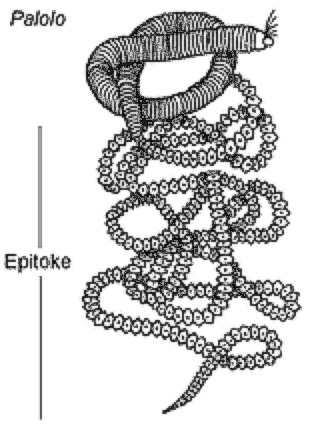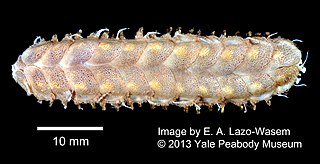
The genus Glycera is a group of polychaetes commonly known as bloodworms. They are typically found on the bottom of shallow marine waters, and some species can grow up to 35 cm (14 in) in length.

Nereis is a genus of polychaete worms in the family Nereididae. It comprises many species, most of which are marine. Nereis possess setae and parapodia for locomotion and gas exchange. They may have two types of setae, which are found on the parapodia. Acicular setae provide support. Locomotor setae are for crawling, and are the bristles that are visible on the exterior of the Polychaeta. They are cylindrical in shape, found not only in sandy areas, and they are adapted to burrow. They often cling to seagrass (posidonia) or other grass on rocks and sometimes gather in large groups.

Eunicidae is a family of marine polychaetes. The family comprises marine annelids distributed in diverse benthic habitats across Oceania, Europe, South America, North America, Asia and Africa. The Eunicid anatomy typically consists of a pair of appendages near the mouth (mandibles) and complex sets of muscular structures on the head (maxillae) in an eversible pharynx. One of the most conspicuous of the eunicids is the giant, dark-purple, iridescent "Bobbit worm", a bristle worm found at low tide under boulders on southern Australian shores. Its robust, muscular body can be as long as 2 m. Eunicidae jaws are known from as far back as Ordovician sediments. Cultural tradition surrounds Palola worm reproductive cycles in the South Pacific Islands. Eunicidae are economically valuable as bait in both recreational and commercial fishing. Commercial bait-farming of Eunicidae can have adverse ecological impacts. Bait-farming can deplete worm and associated fauna population numbers, damage local intertidal environments and introduce alien species to local aquatic ecosystems.

Nephtys is a genus of marine catworms. Some species are halotolerant to a degree in that they can survive in estuaries and estuarine lagoons down to a salinity of 20 psu.

Palola viridis, commonly known as the palolo worm, Samoan palolo worm, balolo, wawo, or nyale, is a Polychaeta species from the waters of some of the Pacific islands, including Samoa, Tonga, Fiji, Vanuatu, and the islands of the maritime Southeast Asia.

Conus ebraeus, common name the black-and-white cone or Hebrew cone, is a species of sea snail, a marine gastropod mollusk in the family Conidae, the cone snails and their allies.
Olli Palola is a Finnish professional ice hockey forward who currently plays professionally for Timrå IK of the Swedish Hockey League (SHL).

Ernst Heinrich Ehlers was a German zoologist born in Lüneburg.
Lysidice is a genus of polychaete worms in the family Eunicidae.
Rhabditophora is a subphylum of flatworms. It includes all parasitic flatworms and most free-living species that were previously grouped in the now obsolete class Turbellaria. Therefore, it contains the majority of the species in the phylum Platyhelminthes, excluding only the catenulids, to which they appear to be the sister group.

Lepidonotus is a genus of marine annelids in the family Polynoidae. The genus occurs globally and includes 80 species, usually found in shallow waters down to about 80 metres.
Oxydromus is a genus of annelids belonging to the family Hesionidae.

Terebella is a genus of polychaetes belonging to the family Terebellidae.
Exocelis is a genus of worms belonging to the family Haploposthiidae.

Ophelina is a genus of annelids belonging to the family Opheliidae.

Cirratulus is a genus of annelids belonging to the family Cirratulidae.

Euphrosine is a genus of polychaetes belonging to the family Euphrosinidae.

Nemertes is a genus of worms, family and order unidentified.

Plesioelasmosaurus is an extinct genus of elasmosaurid plesiosaur from the Late Cretaceous Greenhorn Limestone of Kansas, United States. The genus contains a single species, P. walkeri, known from a partial skeleton.













